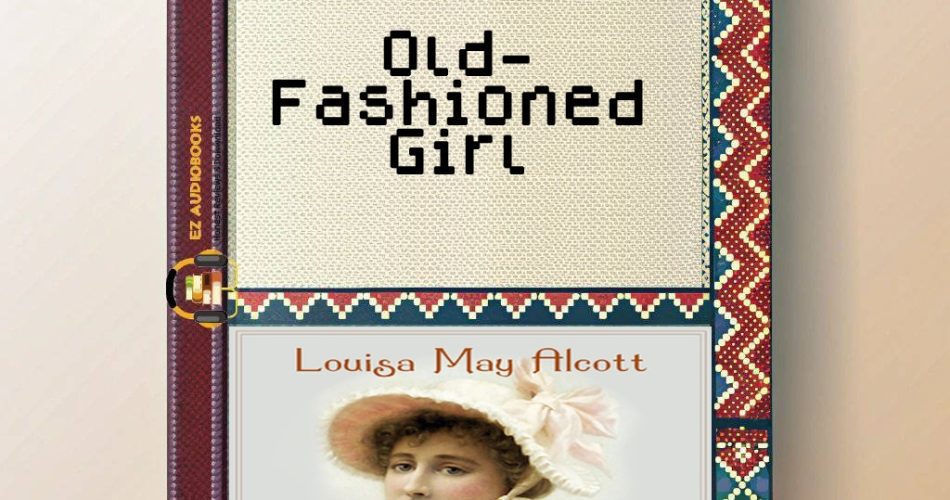Audiobook Sample
Listen to the sample to experience the story.
Please wait while we verify your browser...
- Title: Old-Fashioned Girl
- Author: Louisa May Alcott
- Narrator: Jennette Selig
- Length: 10:15:12
- Version: Abridged
- Release Date: 01/01/2016
- Publisher: LibriVox
- Genre: Fiction & Literature, General
- ISBN13: SABLIB9782727
The first time I heard Jennette Selig’s warm narration of “An Old-Fashioned Girl”, I was curled up in a rustic cabin in Vermont during an unexpected snowstorm. The crackling fire and Selig’s comforting voice created the perfect atmosphere to experience Polly Milton’s journey – a story that, like the snow outside, gently blankets you with quiet wisdom while revealing the sharp contrasts beneath its surface.
Louisa May Alcott’s 1869 novel unfolds like a hand-stitched quilt, each patch revealing different textures of 19th century American life. Polly, our ‘old-fashioned’ protagonist, serves as Alcott’s needle, threading through the gilded fabric of urban society to expose its frayed moral edges. Having spent years observing cultural collisions – from the spice markets of Marrakech to Tokyo’s neon-lit streets – I found particular resonance in Polly’s fish-out-of-water experience. Her initial visit to the wealthy Shaw household mirrors my own early travels, where unfamiliar social codes felt as bewildering as my first encounter with a Japanese tea ceremony.
Selig’s narration deserves special praise for capturing this cultural tension. Her voice carries the crisp clarity of New England autumn air when voicing Polly’s rural honesty, then adopts subtle, affected tones for Fanny Shaw’s fashionable pretensions. The scene where Polly’s homemade gifts are mocked at Fanny’s party particularly shines in audio format – Selig’s delivery makes you feel the hot sting of embarrassment in Polly’s throat, followed by the quiet dignity of her response. It reminded me of watching Mexican artisans patiently continue their craft while tourists demanded cheaper prices – that universal struggle between intrinsic worth and superficial valuation.
Alcott’s themes emerge vividly through audio. The contrast between Polly’s ‘useful’ piano playing (Selig’s playing scenes brim with joyful rhythm) versus the Shaw girls’ performative musical displays becomes an auditory morality tale. The novel’s two-part structure – with Polly’s return as a music teacher six years later – gains depth through Selig’s nuanced aging of voices. You can practically hear the characters’ moral fibers stretching, much like how I’ve heard traditional weavers in Guatemala describe the tension required to create strong textiles.
Some modern listeners might find Polly’s unwavering virtue unrealistic – her goodness can feel as starched as the era’s petticoats. Yet Selig’s performance locates the character’s believable core, particularly in moments of private doubt. The audiobook format amplifies Alcott’s social commentary; when describing the Shaw family’s financial troubles, Selig’s pacing makes their misplaced priorities painfully clear, echoing today’s influencer culture where appearance still often trumps substance.
Compared to other Alcott works, this lacks “Little Women”‘s sweeping emotional arcs, but gains intimacy in audio form. Selig creates what my Oaxacan storytelling mentor called ‘la voz con memoria’ – a voice carrying memory. Her narration transforms Alcott’s sometimes didactic passages into something approaching oral history, making the novel’s critique of materialism feel freshly relevant when heard aloud in our consumerist age.
The free LibriVox production does show its volunteer origins occasionally – slight background noises surface like distant carriage wheels. Yet these minor imperfections oddly suit the story’s homespun charm. For travelers, commuters, or anyone needing a literary palate cleanser from modern life’s rush, this audiobook offers what Polly herself provides the Shaws: unassuming wisdom wrapped in genuine warmth.
With a storyteller’s appreciation for voices that carry us home, wherever that may be,
Marcus Rivera

